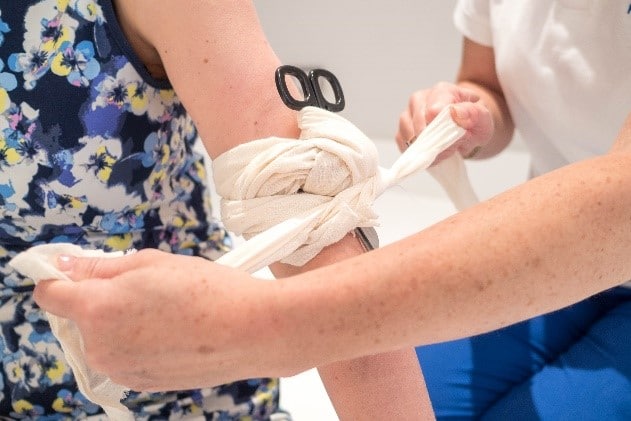First Aid Course
About This Qualification
Anyone can become a first aider, as long as they have the right qualifications and training. A first aider is responsible for helping someone who is injured. If further help is on its way, a first aider can monitor the situation and provide care until a professional medic arrives. To become a qualified first aider, there are two basic first aid courses available. They are the Emergency First Aid at Work (EFAW) and First Aid at Work (FAW)
The first level of training is:
- Emergency First Aid at Work (EFAW): On this Level 2 course, you are trained to provide emergency first aid to someone who is injured or becomes ill while at work, for example, dealing with a conscious person who is breathing with minor wounds or injuries, to an unconscious person who is not breathing and needs CPR (Cardio Pulmonary Resuscitation). This is usually a one-day first aid course.
- The second level of training is:
- First Aid at Work (FAW) – This Level 3 course enables those with the previous EFAW knowledge and training with extra training to deal with a range of other injuries and illnesses, for example, diabetic emergencies, strokes, different types of shock, etc. The course also goes into more depth and covers more complicated situations that may arise. These courses are usually completed over three days.Who Is It Suitable For?This course is helpful for those who wish to be a first aider within the workplace and be first port of call for medical and health problems that can arise within the orkplace.These are some key skills that those who want to become a first aider will need to have or just need a brush up on their skill:
- Communication Skills:
If you are able to communicate effectively with the injured person, they will be much more likely to trust you and feel reassured.
- The Ability to Work under Pressure:
The demands of a first aider can range anywhere from something simple, like a cut finger, to something a lot more serious, like a cardiac arrest.
- Initiative and Leadership:
In an emergency, time can often play a crucial part in the outcome.
- The Ability to Work in a Team:
As well as being able to lead, it is important that you can work effectively in a team.
- Positivity:
Someone who always sees the glass as half full rather than half empty is a prime candidate for a first aider.
- First Aid at Work (FAW) – This Level 3 course enables those with the previous EFAW knowledge and training with extra training to deal with a range of other injuries and illnesses, for example, diabetic emergencies, strokes, different types of shock, etc. The course also goes into more depth and covers more complicated situations that may arise. These courses are usually completed over three days.Who Is It Suitable For?This course is helpful for those who wish to be a first aider within the workplace and be first port of call for medical and health problems that can arise within the orkplace.These are some key skills that those who want to become a first aider will need to have or just need a brush up on their skill:




